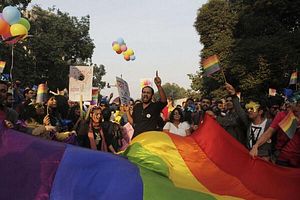Members of India’s gay community, along with LGBT activists around the world, were shocked and disappointed at the Indian Supreme Court’s reinstatement of an 1861 law that bans sexual intercourse between men. The decision overturns a 2009 Delhi High Court ruling that deemed the colonial-era law unconstitutional when applied to consenting adults.
The 153-year-old law, Section 377, deems sodomy an “unnatural offense.” It makes “carnal intercourse against the order of nature with man, woman or animal,” punishable by up to a decade in prison.
Though India’s gay culture has flourished since the 2009 judgment – with university campuses holding gay film festivals and the state of Gujarat hosting the country’s first gay pride parade in October – many activists attribute the setback to an uptick in religious conservatism.
“[The Supreme Court] is supporting patriarchal and religious forces instead of siding with constitutional reason.” Kavita Krishnan, an equality activist in Delhi, told BBC. “What if tomorrow religious groups decide that inter-caste or inter-religious marriages are against the moral values of our society, then would the court make, amend or uphold laws accordingly?”
Though Prime Minister Manmohan Singh’s cabinet largely supported the 2009 ruling, changes to the controversial law are unlikely for the next few years. The socially conservative Hindu nationalist opposition is looking strong ahead of May elections and many Muslim groups have lauded the Supreme Court’s decision.
“These relationships are unethical as well as unnatural,” said S. Q. R. Ilyas, a member of the All India Muslim Personal Law Board and a petitioner in the case. “They create problems in society, both moral and social. This is a sin as far as Islam is concerned.”
“Many consensual relationships of this unnatural nature have existed in India for decades, but that does not justify giving them legal or constitutional sanctity,” Zafaryab Jilani, a Muslim community leader who also filed for the reversal, added. “We are living in India, this is not America, and according to the morals of our society, this is a correct judgment.”
Despite strong words from the ban’s supporters, India’s LGBT activists have pledged to fight on. Gay rights groups have promised to appeal the decision by filing a review petition. If that venue fails, activists could fall back on a “curative” petition that would put the issue before a five-judge bench.
“World over, positive judgments are being made for the rights of the gay community. This is the last thing expected from the world’s largest democracy,” Shaleen Rakesh, the director of India HIV-AIDS Alliance and a petitioner behind the 2009 ruling, told The Wall Street Journal. “We will not give up – The fight for equality will continue.”

































